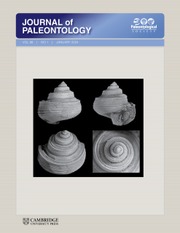Linda J. McCall, Reidsville, North Carolina, is the winner of the 2020 Paleontological Society's Harrell L. Strimple Award for an Amateur Paleontologist. Linda is the first female paleontologist to win this award on her own merits and accomplishments. I have known Linda since the mid 1970s when she was an undergraduate Geology Major at the University of Texas at Austin. She has always been an avid fossil collector, going back to promising localities repeatedly, and has a knack for finding really rare or spectacular specimens, and even whole faunas, at new or well-collected localities.
Linda's finds have resulted in five peer-reviewed papers in which she was involved or was first author. The first was in the Journal of Paleontology (Sprinkle et al., Reference Sprinkle, Henry, Zimmer, Kelley and Whiteley1985), based on a new echinoderm she had found in the Ordovician of southern Oklahoma, and written as an Austin Paleontological Society club project with Linda being the second author. She became first author on the next four papers which were published in the Gulf Coast Association of Geologic Societies (GCAGS) transaction volumes (2008, 2010, 2012), and an Austin Geological Society Guidebook for the 2012 GCAGS Meeting. These were based on two very large faunas and a smaller one of Cretaceous fossils from central Texas that Linda had collected. The late Ann Molineux, Director of the Non-vertebrate Paleontology Laboratory (NPL), and I helped Linda write the first draft for the 2008 paper. Because Linda had done most of the work collecting and preparing these faunas, and had experience producing PowerPoint talks, she became the lead author on these four papers, and presented these at the GCAGS Meetings. She turned out to be very good at writing and presenting these papers, winning two awards from GCAGS: a best paper award for the 2008 Transaction volume paper, and a best presentation award for the 2012 GCAGS Annual Meeting talk. Also, two of these GCAGS Transaction papers (2008 and 2010) were subsequently reprinted in the South Texas Geological Society Bulletin.
Linda has been a member of many fossil clubs since the mid 1970s. She was a member of the Paleontological Society of Austin for more than 30 years, including four years as Vice President, conducting outreach talks at local schools, and planning an annual fossil show for the general public. More recently, Linda has been a member of the North Carolina Fossil Club for 10 years, serving as President from 2013–2017. During this time, she helped edit a series of Guides to North Carolina Fossils, including writing one of the chapters and contributing photographs. Linda is also an active member of many other fossil clubs and professional societies around the US.
Linda is an outspoken advocate for the non-professional paleontological community, working to educate professionals and legislators about what a valuable resource the amateur/avocational community can be towards advancing the science of paleontology. She has served on the Paleontological Society's Ad Hoc Committee on Government Affairs, and remains active in following the Paleontological Resources Preservation Act (PRPA) progress by keeping up an ongoing dialogue with Bureau of Land Management Senior Paleontologist Scott Foss. Linda has also given numerous abstracts and presentations regarding the benefit of professional/non-professional collaboration at various GSA Annual Meetings, Sectional Meetings, and NAPC Meetings. She currently serves as the Avocational Liaison to the Paleontological Society Council.
Linda also advocates donating important specimens to professional institutions and museums. To date, she has donated more than 23,000 fossil specimens to the NPL at the University of Texas, and many hundreds of specimens to numerous other institutions across the US. In recognition of Linda's success during years of collecting, two fossil taxa have been named for her: a new crab genus, “Lindahomola longispina” (Garassino et al., Reference Garassino, Weaver, Portell and Vega2019), and a new echinoid species, “Echinothuria mccallae” (Thompson, Reference Thompson2016).
Linda's current areas of interest include preserved Oligocene, Eocene, and Cretaceous color-marked fossils, and Plio-Pleistocene bivalves with preserved fossil ligaments. For more information about Linda's background and her publication list, please visit https://www.myfossil.org/amateur-spotlight-linda-mccall/.
October 26, 2020



